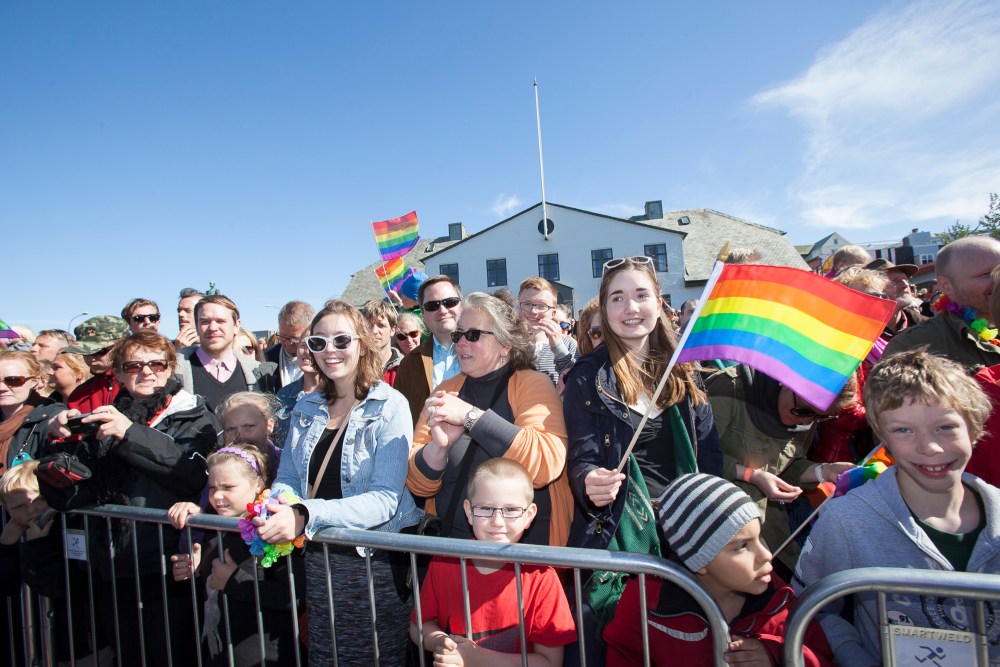The annual Reykjavík Pride is almost upon us, and there is a lot to look forward to. In addition to the parade itself, which sees up to 100,000 people gather to witness floats and marches, there are plenty of festivities going on throughout early August. This includes panels, workshops, art exhibits, and musical performances. This year’s parade manager, Ásta Kristín Benediktsdóttir, tells us more.
In what way has the Reykjavík Pride evolved since its inception?
In 1999, Reykjavík Pride was “just” the parade, but now it is a six-day festival with more than 30 events on the official programme. This great change goes to show how far Icelandic society has come in the last sixteen years. What used to be a day of fighting for basic human rights and social acceptance is now a festival that celebrates the victories that have been won, points out what still needs to be fixed, and seeks to educate and evoke discussions about diverse LGBTIQ issues in Iceland and abroad.
What can you tell us about this year’s themes?
The theme of the festival this year is “health.” We try to focus upon various issues and problems LGBTIQ individuals are facing—in the healthcare system as well as society in general—such as unnecessary surgeries intersex children are subjected to, and how both trans and intersex people are often denied the right to bodily integrity and self-determination. Social stigma associated with HIV is a problem that affects people, as is the fact that many young queer people still find it to be difficult to come to terms with their sexuality in Icelandic secondary schools, which seem to be highly heteronormative and often heterosexist. We touch upon these issues in interviews published in our festival magazine, and we also have various panels and educational events in our programme.
The parade is mostly run by volunteers, but obviously not everything can be done for free. How is it financed, and how do you retain the volunteers year after year?
Although Reykjavík Pride is entirely run by volunteers, it costs millions of ISK to prepare and carry out the six-day-long festival. Reykjavík Pride is hosted by an NGO financed with support from sponsors and its own Pride Boutique, where we sell tickets to events and all kinds of Pride merchandise. Many of our sponsors have worked with us for a very long time, and played a large part of the festival’s growth—the City of Reykjavík has been our biggest sponsor for the past few years.
Reykjavík Pride is organised and managed by the grassroots—we are where we are at today is because of those who came before us, fighting for their lives and dignity. We fight today to remember them, to celebrate where we are, and to reach full equality. That’s probably one of the main reasons why we manage to retain our volunteers—what we do is done for a reason and we put our hearts and souls into it. We’ve been lucky in that a big part of our volunteers return every year, and some of them have even volunteered since the start of Reykjavík Pride. At the same time, we do our best to reach out to new volunteers, and give them the opportunity to learn and take part.
In recent years, members of the drag community have complained about the blanket ban on blackface. Why did the organisers ban it, and what kind of reaction have you gotten from it?
We simply felt that a parade that is focused on human rights cannot accept and represent “blackface” or other kinds of cultural appropriation (which is a highly insulting act although many Icelanders don’t seem to realise that, maybe because we have been so white for so long…). We have heard a few contrary voices, but generally I think most people understand that we set this rule to make sure the parade does not offend or marginalise racial minorities. And there are so many ways to perform as a person from a different racial background other than painting your face. Why not focus on bodily expression or voice?
This year, Iceland’s Queer Association Samtökin ’78 entered new territory by filing charges against ten individuals for hate speech. Will the parade, too, reflect this by addressing hate speech in a more decisive manner than before?
We don’t know! That would be brilliant, because hate speech and how we deal with it is something that we really need to think about. The performances in the parade are not planned by Reykjavík Pride, but by individuals and organisations that apply to participate. We only take care of the practical issues, line them up and make sure they follow basic instructions—the rest is for all of us to see on Saturday, August 8.
One of the big kerfuffles that made the news was the apparent exclusion of the BDSM community from the parade. Can you comment on that?
Our opinion is that this whole media buzz was largely taken out of context. BDSM Iceland has not been excluded from the parade this year because they have not applied (yet). It is true that they consulted the board of Reykjavík Pride last year about their possible participation in the parade. This was, and is, a controversial question and the board—as well as the queer community in general—was split in their opinion on the matter. The bottom line is however that this year Reykjavík Pride and BDSM Iceland are working together on a panel called “BDSM – Sexual Orientation or Lifestyle?” which is set on Wednesday, August 5. This is a cooperation that will hopefully continue and help us all trying to answer the question if BDSM should claim a place under the queer umbrella or not.
In previous pride parades, there has been a lot of representation from the L (lesbian) and G (gay) parts of the LGBTQI acronym. Can you tell me what other groups make an appearance this year?
Trans Iceland has participated in the previous parades and last year Intersex Iceland joined us for the first time. We have no reason to assume that they will not appear in this year’s parade but the deadline for applications has not yet passed and we will just have to wait and see what happens.
Do you know think Reykjavík Mayor Dagur B. Eggertsson will make an appearance this year? Do you think he will follow in former mayor of Reykjavík Jón Gnarr’s shoes by dressing in drag?
Dagur will be in the parade with his family and co-workers like last year, for sure. He has been a bit hesitant about performing in drag, but we will keep on trying to convince him!
How have the numbers of attendees fluctuated between years? Do you have an estimate from each year?
The numbers have exploded from a few thousand in 1999 to as many as 100,000 in the previous year—and this year will be no exception!
—
You may also be interested in the following articles:
 Icelanders In Search Of Neologisms For LGBTQA Contexts
Icelanders In Search Of Neologisms For LGBTQA Contexts
A contest has begun to create Icelandic words for concepts and identity types that have arisen from the LGBTQA community.Icelandic is not a language known for easily borrowing foreign words, and creating new Icelandic words for new concepts can be daunting.
 Páll Óskar: In The Name Of Love
Páll Óskar: In The Name Of Love
The front door is wide open. Giving a little tap on the wooden frame, I hear the boom of his instantly recognisable voice greeting me from the next room. The one and only Páll Óskar strolls into the foyer motioning that he’s on the phone, and leans in to give me the kind of casual half-hug you do with your best friend.
 Xenophobia, Ignorance And Útvarp Saga: It’s Bullshit-calling Time
Xenophobia, Ignorance And Útvarp Saga: It’s Bullshit-calling Time
When it comes to discussions about immigration and multiculturalism in Iceland, most of our daily media focus has been on the things politicians say. This is natural, to an extent—these are the people who write our laws, after all, which will have repercussions for us whether we like it or not.
Buy subscriptions, t-shirts and more from our shop right here!


















